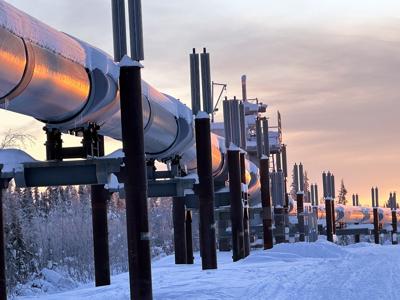A Washington, D.C.-based federal appeals court panel ruled against environmental groups on Tuesday in a lawsuit seeking to block export permits for the Alaska LNG Project.
The Sierra Club and the Center for Biological Diversity sued the federal government over the Biden administration’s April 2023 decision to allow the project to export liquefied natural gas, if it is ever constructed.
In the lawsuit, the Sierra Club argued that the U.S. Department of Energy (DOE) violated federal law by overstating the uncertainty surrounding the project’s potential impact on climate change.
The proposed $44 billion, 800-mile natural gas pipeline would include a carbon capture facility on the North Slope, along with an export terminal and liquefaction plant in Nikiski. The project’s goal is to export North Slope natural gas to Asian markets.
The Biden administration authorized LNG exports to countries without free trade agreements.
In a 12-page opinion written by U.S. Circuit Judge A. Raymond Randolph, the court found that the DOE did not violate the National Environmental Policy Act (NEPA) in approving the export permits.
“Congress expressed a preference for permitting exports, so long as our nation has an abundance of this natural resource, as it does,” Randolph wrote.
The panel also noted that the court had previously determined the Federal Energy Regulatory Commission (FERC) “properly concluded that it was not inconsistent with ‘the public interest’ to build and operate an 800-mile-long pipeline and associated facilities for the purpose of transporting, liquefying, and exporting Alaskan natural gas.”
During President Donald Trump’s administration, the DOE approved the export application in March 2020. The Sierra Club requested a rehearing in September 2020, but that request was delayed until after the 2020 election and President Joe Biden’s inauguration.
On his first day in office, Biden ordered a review of Trump-era regulatory actions. In 2023, the DOE issued a 275-page supplemental environmental impact statement reaffirming its original approval of the export authorization.
Randolph, appointed by President George H.W. Bush, dismissed the environmental groups’ arguments about potential climate impacts as “not well-founded.” He noted that the DOE presented “overwhelming evidence” showing that the climate impacts of LNG exports remain too uncertain to quantify.
“In short, the impacts of downstream emissions in foreign countries are not reasonably foreseeable, and so any alleged failure to quantify those impacts does not amount to a violation of NEPA,” Randolph wrote.
Judges Brad Garcia, a Biden appointee, and Justin Walker, a Trump appointee, joined Randolph’s opinion.
Alaska Gasline Development Corporation (AGDC) spokesman Tim Fitzpatrick issued a statement calling the ruling another sign of the project’s momentum despite legal challenges.
“Alaska LNG has withstood a rigorous multi-year federal permitting process and court challenges from resource development opponents because of the project’s obvious and significant benefits, including enhanced Alaska and allied energy security, cleaner air here at home, reduced global emissions, and lower energy bills for Alaskans,” Fitzpatrick said.
The project has attracted renewed investment interest after years of stagnation. ExxonMobil, ConocoPhillips Alaska, and BP exited the project in 2017, leaving AGDC with full ownership.
In January, AGDC announced a tentative deal with New York-based Glenfarne Group to conduct front-end engineering and design (FEED) studies and move the project toward a final investment decision. AGDC’s board approved the agreement on March 27, giving Glenfarne a 75% stake in AGDC’s subsidiary, 8 Star Alaska.
Former President Trump continues to promote the Alaska LNG project, referencing it in executive orders and public speeches. Gov. Mike Dunleavy and AGDC officials have traveled to Japan and other Asian countries to seek investors.
While the White House has suggested Japan and South Korea will invest, both countries have so far expressed only tentative interest. Taiwan’s state-owned CPC Corporation issued a non-binding letter of support in March.
Despite signs of momentum, the project remains in the planning phase. Construction will take years, and the earliest projected delivery of natural gas is 2031.
On Tuesday, the Sierra Club said it was evaluating its next steps.
“Even in light of this ruling, the fact remains that Alaska LNG is a boondoggle,” said Andrea Feniger, director of the Sierra Club Alaska Chapter. “We firmly believe that Alaska LNG would wreak havoc on the land, water, air, and wildlife in Alaska, unlock even more global climate chaos, and harm energy consumers across the country.”
Feniger added, “The project’s outlook is so bleak that the Trump administration is looking for foreign countries to foot the bill.”

